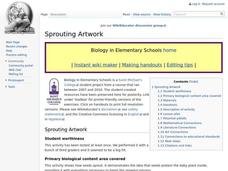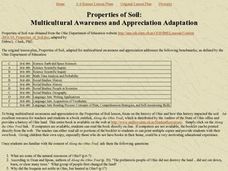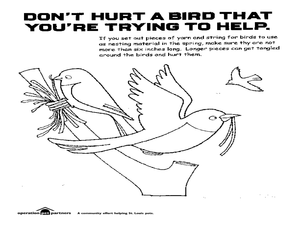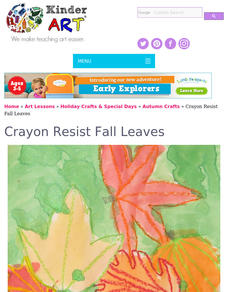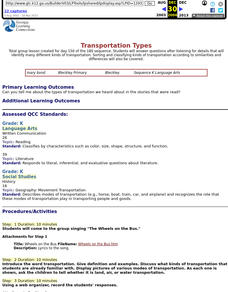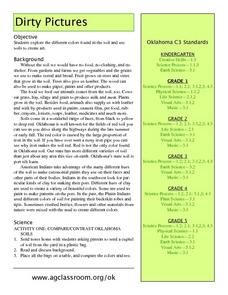Curated OER
Sprouting Artwork
Students complete activities to study seeds sprouting and plant growth. In this plant science lesson, students use mustard seeds and sponges to study the seed sprouting process. Students observe their seeds for several days and complete...
Curated OER
Properties of Soil
Students encounter various pieces of knowledge utilizing lessons that addresses a diversity of learners with multiple intelligences. They cover various concepts: science, Earth, scientific inquiry, geometry, data analysis, probability,...
Curated OER
This is for the Birds!
Students complete activities to investigate wild birds. In this bird study lesson, students make a wild bird feeder to examine the proper ways to care for wild birds. Students explore organizations in their community that help wild birds...
Curated OER
Don't Wake the Baby - Phonics
Students explore beginning reading through the use of phonics. They practice making the /sh/ sound and create a list of /sh/ words. Students practice saying tongue twisters containing /sh/ sounds. They model writing the s and h...
Curated OER
Crayon Resist Fall Leaves
Learners observe the different colors in fall leaves. They create a multi-color fall leaf in the crayon-resist technique.
Curated OER
Mixing Colors
Students listen to a story about mixing colors. They explore color using cups of water, color and coffee filters. They use sight word vocabulary to describe the colors.
Curated OER
Illustrated Letters
Students role play the role of a famous artist living during the 1800s. They write a letter to their friend explaining the impact of this artist on others. In groups, they read primary source documents to examine life during the 1800s.
Curated OER
Summer Scientists
In this lesson, learners discuss and reocrd what makes an object living or nonliving. The students then chart the lists of living and nonliving objects. Teacher allows learners oportunity to go outside and look for living and ninliving...
Curated OER
Where The Green Grass Grows
Students recognize the phoneme /g/. Through matching activities, students discriminate the phoneme /g/ from other letters and phonemes. They associate the phoneme /g/ with its letter representation and identify the phoneme /g/ in various...
Curated OER
Transportation Types
Students answer questions after listening for details that identify many different kinds of transportation.
Curated OER
"IMPRESS"ive Pinch Pot Vases
Students discover and perfect basic construction methods and decorative methods of clay and glaze. They create vases using the pinch method and stamping and impressing methods of decorations. They glaze their pots with pre-made glazes.
Curated OER
Geography: Islands and Alcatraz
Pupils, in groups, create maps of islands including map keys and compass roses. They compare and contrast their island communities with that of the island prison, Alcatraz. Students select from a series of projects, including writing...
Curated OER
Simple Simon Saves the Day
Students recognize, identify, and locate the /s/ sound in spoken or written words. They say a tongue twister with words emphasizing the /s/ sound. They then listen to the story "Simple Simon" and make "finger snakes" whenever they hear...
Curated OER
Give the Dog a Bone
Students listen as the /sh/ sound is modeled and discover the sound as it appears in the words "sheep", "fish", and "ship". They then play a secret game with a magic code placing the correct dog with its bone. Once all the words are...
Curated OER
Agriculture is a Cycle
What do a bicycle and the life cycle have in common? Cover this and more with the series of cross-curricular activities included in this plan. Learners do everything from making bracelets that represent the life cycle to checking out the...
Curated OER
Sock Walk
First graders, after brainstorming all the ways seeds are scattered and viewing a multitude of examples of seeds, explore how seeds travel by taking a walk outdoors wearing socks over their shoes. In addition, they assess how seeds...
Curated OER
Dirty Pictures
Students investigate how food, clothing and shelter come from soil after they examine soil from their own backyards. They map soils on the color wheel before making glue and soil pictures and tie-dying T-shirts in red soil.
Curated OER
Making Paper
Pupils make paper from recycled paper. The student estimates, counts, and measures he amount of paper consumed in a classroom daily. They discover that if we use too much paper, it fills up landfills. Some activities they are doing...
Curated OER
A Trip To the Animal Fair
Students share their experiences they have had with animals. Using photographs of their own pets, they create a booklet out of construction paper in which they identify the pets needs. They also compare and contrast what they need to...
Curated OER
I Am Special and You Are Special Too #3
Students explore the meaning of unique and special. They study about why a birthday is significant. They investigate how families celebrate birthdays in different ways and they reflect on why growing up is a good thing.
Curated OER
Bubble Blast
Students explore the ingredients and properties of bubbles. They participate in various bubble blowing activities, and write a paragraph describing their best bubble.
Curated OER
Froggy Fun
Students exploring about frogs and their environment. They describe what camouflage is and why it is useful to frogs especially in the environment that frogs live in. They also draw a picture of a frog in its habitat.


